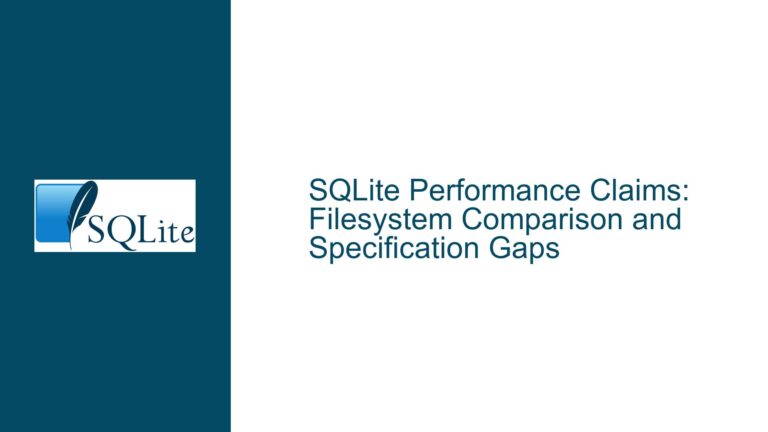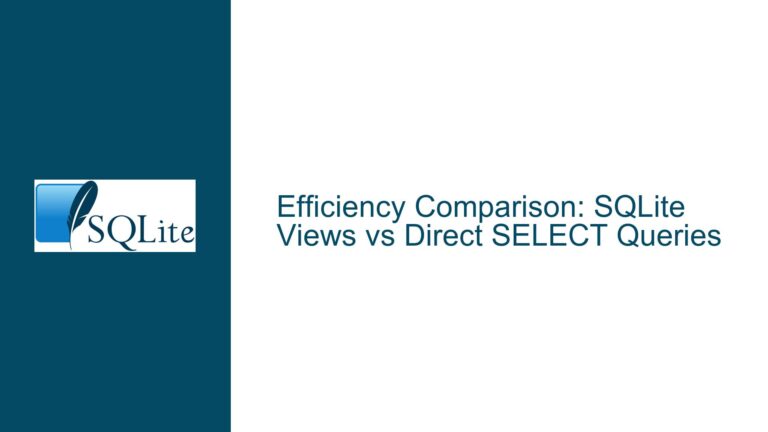Optimizing SQLite Floating-Point Precision and Performance
Understanding SQLite’s Use of long double and Its Implications
The core issue revolves around SQLite’s internal use of the long double data type for high-precision floating-point computations. While long double can offer increased precision and performance benefits on certain platforms, its implementation and hardware support vary widely across compilers and architectures. This variability introduces challenges in maintaining consistent behavior, optimizing performance, and reducing binary size, particularly in environments like WebAssembly (Wasm) where hardware support for long double is either absent or emulated inefficiently.
The discussion highlights several key points:
- Compile-Time vs. Runtime Decisions: The current implementation of SQLite uses runtime checks (
sqlite3Config.bUseLongDouble) to determine whether to uselong doublefor high-precision calculations. However, this approach leaves dead code in the binary whenlong doubleis not supported or explicitly disabled at compile time. - Platform-Specific Behavior: On some platforms, such as those using LLVM/Clang for Wasm compilation,
long doubleis mapped to__float128, which is not hardware-accelerated and incurs significant performance and binary size overhead. - Proposed Optimizations: By introducing compile-time checks (e.g.,
sizeof(LONGDOUBLE_TYPE) > 8) and new compile-time options (e.g.,-DSQLITE_USE_LONG_DOUBLE), SQLite can eliminate unnecessary code and improve portability without sacrificing precision or performance.
Challenges with long double Support and Hardware Variability
The variability in long double support across platforms and compilers is a significant challenge. While long double can provide higher precision and performance on x86/x64 architectures with proper hardware and OS support, its utility is limited on other platforms, such as ARM or Wasm, where hardware support is either absent or emulated inefficiently. This variability complicates SQLite’s internal logic for floating-point computations and introduces unnecessary overhead in environments where long double is not beneficial.
One of the primary issues is that sizeof(long double) > 8 does not guarantee that the platform supports high-precision floating-point operations. Some compilers report sizeof(long double) == 10 or sizeof(long double) == 16 but still use 64-bit doubles internally, leading to inaccuracies in computations. This discrepancy necessitates runtime checks to determine whether long double is usable, which in turn requires both code paths (with and without long double) to be included in the binary.
In environments like Wasm, where long double is often emulated as __float128, the performance and binary size penalties are significant. The emulation relies on software-based floating-point operations, which are slower and require additional library code. This not only increases the binary size but also introduces potential compatibility issues, such as linker errors when using certain compiler flags (e.g., -mmulti-value).
Solutions and Best Practices for Floating-Point Precision in SQLite
To address these challenges, SQLite can adopt a more nuanced approach to handling high-precision floating-point computations. The following solutions and best practices can help optimize performance, reduce binary size, and improve portability:
Compile-Time Configuration: Introducing compile-time options like
-DSQLITE_USE_LONG_DOUBLE=0and-DSQLITE_USE_LONG_DOUBLE=1allows developers to explicitly control whetherlong doubleis used. This eliminates dead code and ensures that only the necessary code paths are included in the binary. For example, setting-DSQLITE_USE_LONG_DOUBLE=0disableslong doubleentirely, while-DSQLITE_USE_LONG_DOUBLE=1enables it where supported.Platform-Specific Optimizations: For platforms like Wasm, where
long doublesupport is either absent or inefficient, SQLite can default to usingdoubleinstead. This reduces binary size and avoids the performance penalties associated with emulatedlong doubleoperations. Additionally, compile-time checks (e.g.,sizeof(LONGDOUBLE_TYPE) > 8) can be used to conditionally includelong doublecode only when it is likely to be beneficial.Dekker Algorithms as an Alternative: In cases where
long doubleis not available or not beneficial, SQLite can fall back to using Dekker algorithms for high-precision floating-point computations. These algorithms provide similar precision without relying on platform-specific features, making them a more portable and reliable alternative.Deprecating
long doubleSupport: Given the diminishing hardware support forlong doubleand the minimal performance benefits it provides, SQLite could consider deprecatinglong doubleentirely. This would simplify the codebase, reduce testing complexity, and improve portability. The performance impact of this change would be negligible, especially when compared to the performance gains from other optimizations in recent SQLite releases.
By adopting these solutions, SQLite can achieve a more robust and efficient handling of floating-point computations, ensuring consistent behavior across platforms while minimizing overhead and maximizing performance. These changes align with SQLite’s philosophy of simplicity, portability, and reliability, making it an even more versatile and powerful database engine for a wide range of applications.






